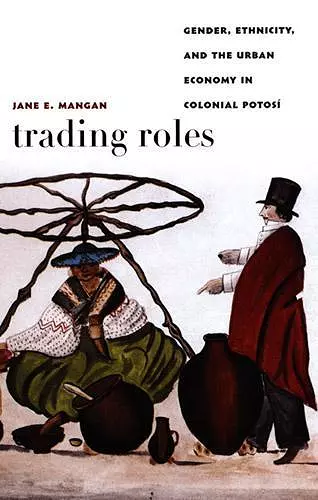Trading Roles
Gender, Ethnicity, and the Urban Economy in Colonial Potosí
Format:Paperback
Publisher:Duke University Press
Published:17th May '05
Currently unavailable, and unfortunately no date known when it will be back

A social history of trade in a colonial city in Peru, arguing that markets, stores, and taverns were important sites of cultural creation and showing how the gender and ethnic identities of participants affected how they adapted to the market economy.
Located in the heart of the Andes, Potosí was arguably the most important urban center in the Western Hemisphere during the colonial era. It was internationally famous for its abundant silver mines and regionally infamous for its labor draft. Set in this context of opulence and oppression associated with the silver trade, Trading Roles emphasizes daily life in the city’s streets, markets, and taverns. As Jane E. Mangan shows, food and drink transactions emerged as the most common site of interaction for Potosinos of different ethnic and class backgrounds. Within two decades of Potosí’s founding in the 1540s, the majority of the city’s inhabitants no longer produced food or alcohol for themselves; they purchased these items. Mangan presents a vibrant social history of colonial Potosí through an investigation of everyday commerce during the city’s economic heyday, between the discovery of silver in 1545 and the waning of production in the late seventeenth century.
Drawing on wills and dowries, judicial cases, town council records, and royal decrees, Mangan brings alive the bustle of trade in Potosí. She examines quotidian economic transactions in light of social custom, ethnicity, and gender, illuminating negotiations over vendor locations, kinship ties that sustained urban trade through the course of silver booms and busts, and credit practices that developed to mitigate the pressures of the market economy. Mangan argues that trade exchanges functioned as sites to negotiate identities within this colonial multiethnic society. Throughout the study, she demonstrates how women and indigenous peoples played essential roles in Potosí’s economy through the commercial transactions she describes so vividly.
“Trading Roles is a pioneering study. The mass of research Jane E. Mangan has put into the work is truly amazing. She makes the lives of the vast majority of the population of Potosí come alive.”—Erick D. Langer, author of Economic Change and Rural Resistance in Southern Bolivia, 1880-1930
“Trading Roles is an unusually lively, detailed account of ‘the underdogs’ of a colonial Spanish American city. It draws attention not only to relatively invisible historical actors but to the rich texture of the deals and socially patterned expectations that brought them together.”—Kathryn Burns, author of Colonial Habits: Convents and the Spiritual Economy of Cuzco, Peru
“A fascinating and detailed case study based on important and original research. . . . Trading Roles makes a significant and thoughtful contribution to our understanding of specific networks of exchange, credit, and interaction in colonial Peru.” -- Caroline Dodds * Sixteenth Century Journal *
“[Mangan’s] narrative style and scholarship clearly will set a high standard for years to come.” -- Michael D. Gambone * American Historical Review *
“In the historiography on colonial Potosí, Mangan’s work is distinctive for its concentration on the grassroots of daily market activities and mundane business dealings. . . . The great strength of Mangan’s book is that she brings to life the world of the common vendors, artisans, merchants, and suppliers that made a great colonial city work.”
-- Timothy E. Anna * Colonial Latin American Historical Review *
“Mangan is always in firm control of her abundant data, no small achievement in this kind of research. This is the best study we have of the lower to middling urban castes and classes. . . . Mangan significantly advances the field of Andean history.” -- David Cahill * Ethnohistory *
“This is a highly readable, well-argued study appropriate for courses on the urban economy as well as gender history. . . . It does offer an inclusive and fresh approach to understanding how women and men of all ethnic groups came to create a colonial world in Potosí.” -- Karen B. Graubart * Hispanic American Historical Review *
ISBN: 9780822334705
Dimensions: unknown
Weight: 431g
296 pages